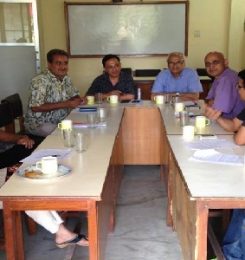

Media Education
Media Education
Nepal’s fast-evolving media landscape has dramatically altered the ways in which people express themselves. Today, this increasingly complex, mediated environment presents many cognitive and analytical challenges to students, teachers, professionals, policymakers, citizens and ordinary users. Suddenly, the need for media education has taken on a new urgency.
Media Foundation believes that every citizen is entitled to media education, which alone ensures true freedom of expression and right to information, the pillar stones of any democratic society.
Media education, the process of learning about media and their effects, is essential for individuals and societies to become media literate. This process enables critical appreciation of media by citizens as well as helps enhance their participation in the political and cultural life of their communities. Our goal is engagement with media rather than a negative appraisal of media. MF activities focus on both formal and informal education, covering traditoinal and digital literacies (media, news, information, ICT), including learning skills, research, career and online identity, etc.
Themes of learning focus on the mode of media operations, media skills, ‘hands-on experiences’, critical analysis of media texts, cultural contexts, access, media creation/production, reception, etc.
MF views “media literacy” more as an outcome of “media education”, the learning process (academic or informal). This outcome consists of competencies in understanding the grammar of media, awareness of the process of mass communication and media contexts, and the ability to access, evaluate, analyze, create and participate with media messages in diverse forms and formats.
In Nepal, the relatively new field of “media literacy” has focused on programs aimed at social activism. MF’s objectives in literacies focus on empowering citizens to be active media users who are competent in producing and receiving content, and in understanding the social, economic and political contexts in which the media operate, and their roles and effects in society.
Activities: Training/workshops, publications, development of teaching and learning methods, tools and applications such as curricula, booklets, audio-visual matterials, etc. To enhance easy and greater public access to institutional and cultural resources related to media and their evolution in Nepal, MF also undertakes or supports activities to restore, preserve and promote the country’s journalism, communications and media heritage via digital and traditional means.
Program Categories
© Media Foudation- 2024 | Site by: SoftNEP
